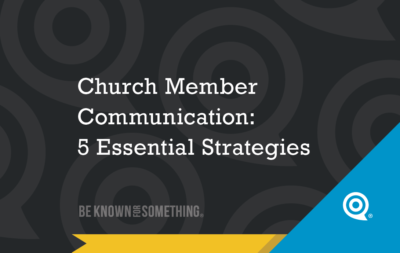The Basics: What’s a Communication Strategy?

A communication strategy is essential. When left uncontrolled, church communication spirals into “we do what’s right in everyone’s mind”. And when every ministry runs its own communication playbook, it creates a chaotic, noisy, and ineffective stream of messaging that’s ignored.
Your communication must be controlled by a pre-determined and pre-approved communication strategy that calms messaging. And allows the correct people to respond to the best ministry services for them. This strategy needs to be implemented everywhere; throughout all ministries; because if it’s avoided or circumvented by anyone, it’s not a communication strategy. Instead, it becomes a political minefield where pet projects and influential people obtain more than they should. Sadly, this is where most churches find themselves. Let’s solve this.
A communication strategy must enable clear, effective communication that leads people to a decision. The moment your strategy becomes oppressive or inconsistent? It’ll crumble — and will lead leaders to discover how to avoid the rules.
Here are 6 components of a successful church communication strategy:
- Structuring a communication team that’ll work within expectations and budget. Deciding between centralization and decentralizing establishes how projects are produced and how communication is planned. Leadership, approvals, and standards all must be decided too.
- Consistency of brand so you become known for something. Discovering your branding thread will help identify what all your church ministries are known for. Because the thread is developed from the community and congregation’s needs and goals, it will build an audience. A visual brand guide (logo, font/color palette) completes the control required for all messaging and graphics.
- Protecting families from too many events within a timeframe. A unified communication calendar is established and maintained with tiered events helping to determine which opportunities need to reach the most people. The top tier is for “everyone”; the lower tiers are for fewer.
- Restricting ministries from contributing to the noise. The more people need to be aware of an event (tiering); the louder the communication voice. Everyone else needs less voice. Rules need to be established to determine what each tier can use for promotional channels and tools.
- Establishing a relationship funnel to lead people in discipleship. Once engagement occurs, there need to be the next steps to lead interested people towards end goals. Steps and goals must be written and approved.
- Protecting the communication team by implementing a transactional strategy. Timing and expectations for producing communication work must be established and approved. Failure to structure this process will lead to burnout, last-minute completion of materials, and (at worst) missed deadlines and disappointment.
Want 25 Game-Changing Resolutions?
Related Posts

Church Branding: Why Every Church Is Known for Something
Everyone is known for something, including your church. This is the heart of church branding. The real question isn’t whether

Church Welcome Video Tips Every Pastor Should Use
Your church welcome video is often the first message people experience before they ever step into your building. Long before

Church Member Communication: 5 Essential Strategies
When someone decides to join your church, your communication becomes more than information; it becomes discipleship. Too often, well-meaning churches


